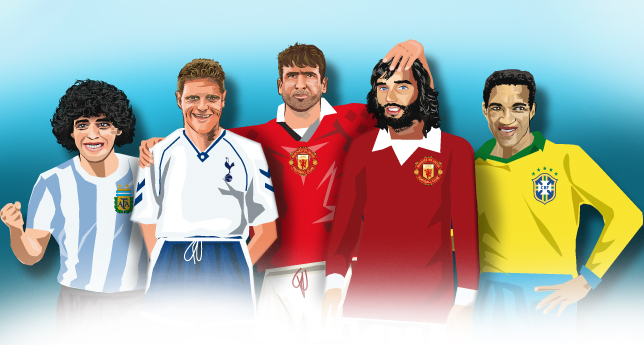
“No great mind has ever existed without a touch of madness.” This famous line was uttered by ancient Greek philosopher, Aristotle, and while it came more than 2,000 years before the game of football officially came into existence, it seems tailor-made for some of the beautiful game’s most memorable players.
Some of the greatest footballers to ever grace a pitch, however, were also some of the most tortured souls away from it. While Pele, Lionel Messi, Johan Cruyff and Franz Beckenbauer delighted with the ball at their feet and were perfect role models, other more colourful characters are just as widely revered for both their ability on the field as well as their misdemeanours away from it.
Here, in line with the release of the new Diego Maradona documentary by Asif Kapadia, we take a look at five individuals whose flaws off the field could not dim their brilliance on it.
DIEGO MARADONA
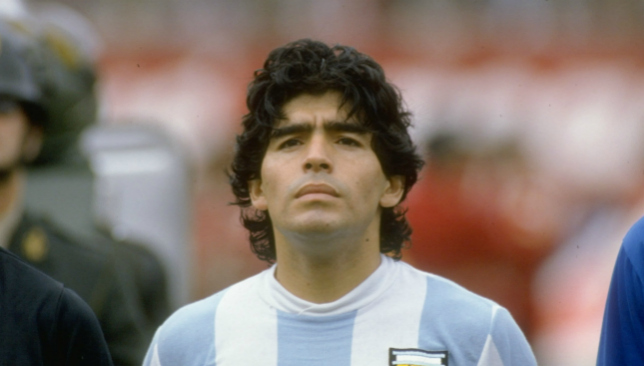
In any conversation discussing the most brilliant yet baffling icons of the beautiful game, the one figure who will undoubtedly always feature is Argentine icon Maradona.
Standing at just 5ft 5in tall, El Pibe de Oro (the Golden Boy) is someone who casts an indelible shadow over every other footballer that came before or after him.
He is arguably the greatest footballer ever, as well as perhaps the game’s most controversial figure – but someone you can’t help but adore.
An addiction to cocaine was allegedly said to have begun following his move to Barcelona in 1982, while he also suffered with obesity post retirement which led to gastric bypass surgery in 2005.
While off the field his lifestyle was always questionable, on it his genius was undeniable. He led Argentina to World Cup success in Mexico 1986 – scoring five goals and netting five assists as he picked up the tournament’s best player award.
The 2-1 quarter-final victory over England showcased the best and worst of Maradona. He scored both goals, the first with his hand that became known as the “Hand of God” goal, the second a 66 yard dribble past five England players that was voted as the Goal of the Century by FIFA.com voters in 2002.
He enjoyed his most prolific success with Napoli from 1984-91, with two Serie A titles lifted, a Coppa Italia as well as the UEFA Cup with the Partenopei.
He played in four World Cups but his international career – which yielded 34 goals in 91 caps – ended in disgrace at USA 94 following one of the most infamous goal celebrations ever.
Maradona, then aged 33, scored in a 4-0 win over Greece but was sent home after failing a drug test for doping following a maniacal celebration in which he ran towards a sideline camera shouting wildly, with his face distorted and eyes bulging.
PAUL GASCOIGNE
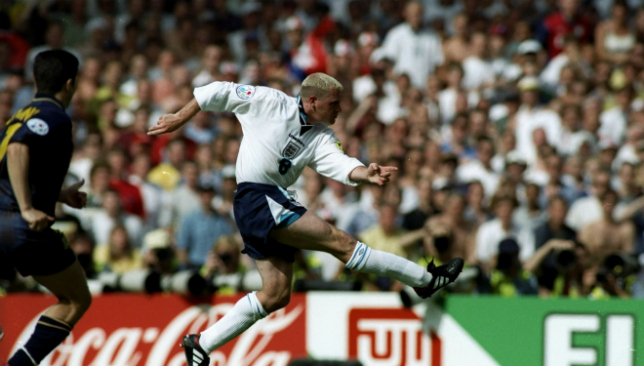
Not many footballers have endured the trials and tribulations throughout a tumultuous existence quite as much as Gascoigne. A tremendous talent haunted by terrible demons, the 52-year-old has battled bulimia, OCD and a bipolar disorder during his life, as well as addictions to alcohol and drugs.
He has suffered bankruptcy, was convicted of domestic abuse and has been jailed or sectioned on numerous occasions since ending his playing days in 2004.
And who can forget the infamous incident in July 2010 where Gascoigne turned up at the scene of a police stand-off in Northumberland, convincing himself following a drugs and alcohol-fuelled binge that he was friends with armed gunman Raoul Moat, who eventually killed himself after a week on the run.
Gascoigne turned up at the scene, wearing a dressing gown, with a fishing rod and a cooked chicken, claiming to know the suspect and that he could help. He was promptly sent home by police, remembering none of what happened the following day.
None of these madcap incidents though have eroded the place many English football fans hold in their hearts for the man affectionately known as ‘Gazza’. His tears during the 1990 World Cup semi-final loss to Germany endeared him to the British public.
Widely recognised as one of the most naturally gifted footballers England has ever produced, Gascoigne began his career with boyhood club Newcastle United, winning the 1987/88 PFA Young Player of the Year before signing for Tottenham for a record British fee of £2.2 million.
He spent three seasons in Italy at Lazio before his most prolific spell at Scottish side Rangers, with his career then petering out at Middlesbrough, Everton, Burnley, Gansu Tianma in China and Boston United.
GEORGE BEST
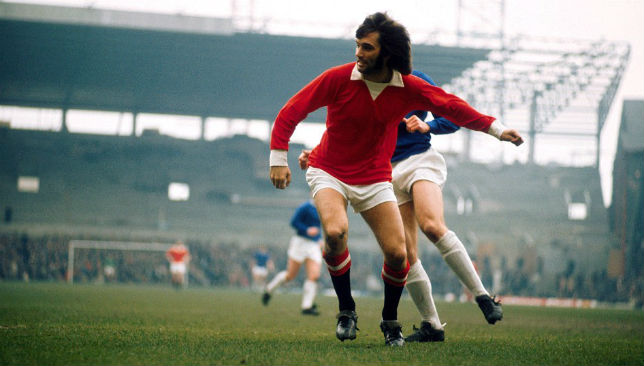
Another iconic British talent who, as brilliant as he was, saw his career besieged by alcoholism. Best is regarded as one of Manchester United’s greatest – if not the greatest – ever players.
A highly skilful, technically gifted winger, Best is considered one of the greatest dribblers in the game’s history. With his good looks and love of the playboy lifestyle, he became the first rock ‘n’ roll footballer, earning the nickname “El Beatle” in the 1960s, which helped spawn the personas of Maradona and Eric Cantona.
Best would go on to score 179 goals in 470 appearances for United in 11 seasons and claimed the 1968 Ballon d’Or after helping United beat Benfica 4-1 at Wembley that year to become the first English side to win the European Cup.
He would also help them win two first division titles but his career went into a tailspin after leaving Old Trafford in 1974 – Best was just 27.
He went on to play in South Africa, Ireland, the United States, Scotland, Australia and Hong Kong before eventually calling it a day in 1984.
Despite his good looks Best was renowned as shy during his formative years, which perhaps explains an increasing reliance on alcohol, something that turned into a severe problem in later years.
A serial womaniser who was also accused several times of domestic abuse, Best spent Christmas of 1984 behind bars for failing to answer bail in relation to drink driving and assaulting a police officer.
He almost died while undergoing liver surgery in 2002 and his continued alcoholism eventually led to his death in November 2005, aged just 59.
GARRINCHA
Garrincha and Pele for Brazil 🇧🇷 Telepathic. Like twins.
— Oluwashina Okeleji (@oluwashina) 22 May 2019
40 games
00 defeats
36 wins
04 draws
55 goals
✍️ Chuteira.Preta (IG)
Put a ball at his feet, and the man they called Garrincha - the little bird - could just about do anything. The angel with bent legs.
Pele: Ask Google! pic.twitter.com/P7HUwAuENB
Pele and Maradona – prior to Messi’s arrival – are widely regarded as the two best footballers of all time, but one Brazilian criminally underrated was the man nicknamed by his sister as Garrincha (Little Bird).
His footballing success was remarkable considering he was born with a deformed spine while his right leg bent outwards and his left leg was six centimetres shorter than the other and curved inwards. Doctors initially thought he would never walk properly, let alone play football.
And yet, in 60 games with Manuel Francisco dos Santos in the team, El Canarinho lost just one match and it was he – not an injured Pele – who was instrumental to the Samba Boys’ second World Cup success in 1962, having both debuted during the triumphant 1958 tournament.
Garrincha became the first player to win the Golden Ball (player of the tournament), Golden Boot (leading scorer) and World Cup at the same tournament – he made the All-Star Teams at both.
Following that maiden 1958 World Cup triumph, Brazil’s two stars took very different paths. While Pele became football’s first true superstar and lived the life of a model professional, Garrincha lived in the moment.
A reluctant star, his brilliance on the field was mirrored by a cacophony of ill-behaviour off it.
Garrincha, who couldn’t read or write, was said to have lost his virginity to a goat, before his fame led to alcoholism and becoming a serial womaniser, who fathered at least 13 children.
He killed his mother-in-law in a car crash during which he was drink driving in 1969, and attempted suicide on numerous occasions, before drinking himself to death in 1983.
He had become totally anonymous to the public for the last five years of his life and yet his funeral was so enormous it was held at the 100,000 capacity Maracana Stadium.
ERIC CANTONA
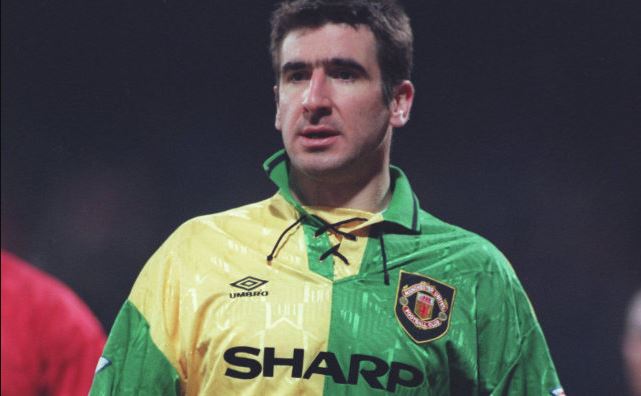
Like Best, “King Cantona” is in the conversation as possibly United’s greatest player – despite the fact he wore the famous red shirt for only five seasons.
But the impact the flamboyant Frenchman had on a developing young squad during that time is immeasurable. He essentially symbolised the spark for United’s unprecedented success throughout the Sir Alex Ferguson era.
An eccentric and often controversial figure, Cantona re-inserted a swagger into United’s style of play and was seen as the main catalyst behind their resurgence in the early 1990s. His 16 leading assists and nine goals played a significant role in the Red Devils lifting the 1992/93 Premier League title, ending a barren 26-year top-flight league success for the club.
He would win the title in four of his five seasons with United, as well as two FA Cups, and is credited with aiding the development of the club’s talented crop of young stars, particularly the famed ‘Class of 92’. He promptly retired from football after leaving United at the end of the 96/97 season – still aged only 30.
As brilliant and popular a player as he was, controversy followed the Frenchman throughout his career – discipline was always an issue since a 1987 incident in which he was fined for punching Auxerre team-mate Bruno Martini in the face.
He was banned from France matches for one year after insulting the national coach Henri Michel on TV.
He moved to England and won the First Division title with Leeds in 1991/92 before joining United that summer. His infamous kung-fu kick on Crystal Palace fan Matthew Simmons following a red card in January 1995 ended up earning him a nine-month ban.
United lost the league that year to Blackburn but Cantona set up one and scored the equaliser on his United return in a 2-2 draw against Liverpool at Old Trafford in October 95.
Cantona was instrumental in the second half of the season as United clawed back a 10-point gap to Newcastle to win the league. He also scored the winner in the FA Cup final as United beat fierce rivals Liverpool 1-0.